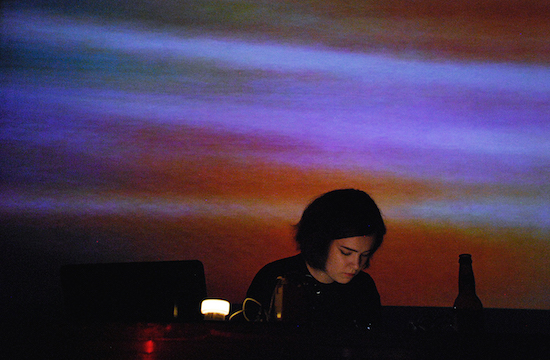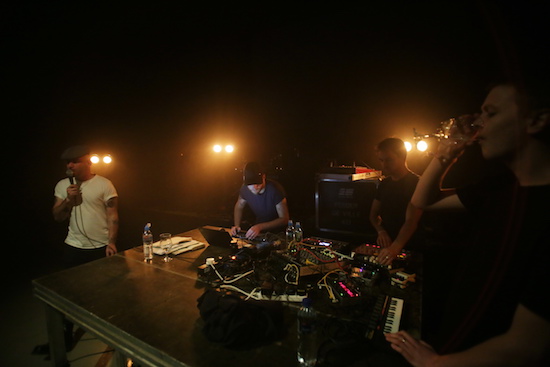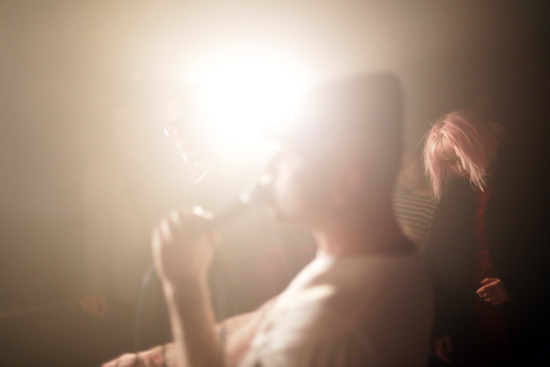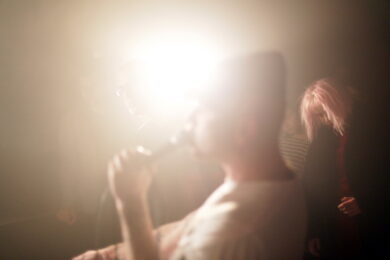On the journey back to Riga airport, I feel pangs of guilt for concluding that a lairy quartet of white British lads were my favourite thing at a festival as diverse as Skaņu Mežs. Fourteen editions deep, and the festival held (mostly) in the Latvian capital is an excellently curated celebration of an international music underground that’s more unpredictable than ever. New Yorker and so-described ‘Queer Hip Hop’ rapper, Zebra Katz headlines the packed out Saturday night alongside the neo-goth pop of Tropic of Cancer, the solo project of Camella Lobo from the other side of the States in California. Both aptly take to the stage with gigantic heaps of filmic melodrama.
To a tape of that gospel cover of ‘Everybody’s Free’ from Baz Luhrmann’s Romeo + Juliet, Zebra Katz creeps through the crowd of Latvians from the back of the room, eventually to climbing the front of the stage to stand, like Yeezus Christ himself, a mask of shiny beads flowing over his visage. The gigantic bass throbs, 808 snaps, and glacial synth tones backing him up are the weirdest bit of the performance though, and Zebra Katz himself is just a swaggering exercise in style over substance – which is definitely no bad thing at all. The biggest complaint these sorts of fringe music festivals get is being too serious and not nearly enough fun, yet provided you’ve got the stomach for a few momentary flashes of truly Sunn O))) bass throbs, Zebra Katz (similar to the likes of Kanye or even Gaika for that matter) is just a ridiculously watchable ego spewing bangers. This ain’t rocket science, it’s a bloody music festival! Similarly, Tropic of Cancer’s mix of glum Joy Division loops and Julee Cruise dreamstates – all conjured by pointedly simple layers of drum machine, synth, guitar, and voice – is an exercise in pure aesthetic. The projections behind Camella Lobo and her guitarist are snippets of surreal domestic imagery, digitally frayed and worn like an instagrammed Kenneth Anger short. Neither is a word spoken by Camella Lobo that’s not bathed in churchian reverb. The pair stand in dead serious darkness on the stage, barely moving a muscle (the music requires little movement anyway). The resultant atmosphere keeps the biggest audience of the festival utterly spellbound.
The night before, Skaņu Mežs boasts a night of compelling music for the chin scratchers, including a stunning audiovisual turn from Klara Lewis, a surprisingly swinging free-jazz matchup of saxophonist Charles Gayle with drummer Roger Turner and double bassist John Edwards, a heavy late night beat session from Vatican Shadow, and a massive fog-ridden set from King Midas Sound + Fennesz. Special attention should go to the final acts on the bill, though: local solo guitarist Matīss Čudars, followed by Latvian improv outfit Mona De Bo. Čudars (born in 1991) plays in various projects and lineups, but here presents a raw solo electric guitar improvisation with no apparent use of effects. For dozens of minutes Čudars plucks away at lightning speed on the same notes, never quite slipping into a groove or melody. It’s an outright bonkers act of precision and strange virtuosity. Local legends Mona De Bo are nowhere near as young, having existed in various lineups for just over a decade. Nearly every local one speaks to at the festival recommends you stay up late to check them out in the earliest hours of Saturday morning. Appearing as a duo of drummer Edgars Eihmanis and guitarist Edgars Rubenis, Mona De Bo are indeed every bit as compelling as the locals would have us think. They recall the darkest depths Keiji Haino’s Fushistsusha project reached at the tail end of the 80s, with Eihmanis spiralling nutjob hand falls over his kit while Rubenis blends tabletop electronics with long sustained dark chords, later delay-pedalling them into shuddering psychedelic noisescapes. Mona De Bo do anything but send us to sleep in the post-4am nether regions.

For all its late night dreamworlds, stages hidden behind a wall of smoke machine fog, christlike figures silhouetted before throngs, and slick audiovisual experiences, it’s actually the relatively back-to-basics set of Killing Sound which feels most like an epiphany. One of the many offshoots of Bristol’s multifaceted Young Echo crew, the trio of Seb Gainsborough (Vessel), Sam Kidel (El Kid), and Amos Childs (half of Jabu) have as of yet only released a B-side of a split tape that christened Bristolian cassette label No Corner, plus a 12" on Blackest Ever Black.
Both releases were great however; isolating, noisy, challenging, and above all bleak instrumental explorations that saw the trio sparring their differing approaches. Vessel’s brutalism, Jabu’s haunted soul, and El Kid’s rinsing high-end industrial dub collided creating what Sophie Coletta described on tQ as instrumentals bristling "with antagonism beneath, violence waiting around every corner".
Now however, the trio have expanded into a quartet, adding poet/vocalist Chester Giles to the lineup. Giles has been visible (from my point of view anyway) as a fringe member of the Young Echo crew since roughly 2015, contributing stellar spoken words to singles with Jabu, Ossia (also of Young Echo), plus a pair of releases as half of rugged noises/words duo Asda with Seb Gainsborough. Asda’s 12" The Abyss put out on No Corner earlier this year had Giles’ voice mired in distortion and delay, toasting over Vessel’s most brutal production work yet, ultimately resembling some nightmarish meetup between Mike Skinner and Merzbow (‘MerzStreets’?), or perhaps a Throbbing Gristle gig fronted by The Last Poets. When it comes to the preoccupations of Giles’ poetry, they were discernible somewhere beneath the distortion on The Abyss – namely deep seated thoughts of violence ("oh i could be a / killer of men / it wouldn’t bother me none") and sexual frustration ("your knickers do something to me when they are off and you have been inside them").
<iframe width="100%" height="450" scrolling="no"
frameborder="no" src="https://w.soundcloud.com/player/?url=https%3A//api.soundcloud.com/playlists/217105323&color=ff5500&auto_play=false&hide_related=false&show_comments=true&show_user=true&show_reposts=false">
As the opening act on early Saturday evening, Killing Sound aren’t expecting to play to a filled out room. Having cut their teeth in the dank basements, small clubs, and dark pubs of the Bristol scene, they do the obvious thing and set-up their gear on a single table on the floor, totally ignoring the stage behind them. A sparse audience hover around the edges of the space as the quartet power on the keyboards, samplers, and mixers atop the table, and Chester Giles happily suggests we all gather round the table as close as we like. "We’re not used to playing a room this size", he explains. Like a right plum I walk right up and stand about half a metre from the table. The setup for the improvised session looks much closer to a DIY noise show than anything else. Rather than mysteriously hitting buttons we’ve no idea what they’re doing, or cueing Ableton to do whatever it does exactly, the topography of the sound is pretty plain for all to see (especially from so up close). Amos Childs spends almost the entire gig tinkling melodies out from a cheap little keyboard you could fit in your schoolbag, Sam Kidel’s wonkily summoning glitchy high end tones from a Macbook (whenever he’s not dancing that is), and Seb Gainsborough takes on the role of a drummer, paying his sampler like a drum kit. The blistering ball of energy that is Chester Giles inevitably becomes a bit of a focal point though. Initially he stands before a book of his poetry intoning as the instrumental trio creak into action conjuring black dubscapes, but soon crunchy beats and distorted basslines blend in, and Giles marches around the table and through the crowd while MCing around between the madness, sadness, and wit of Consumer Electronics’ Philip Best, Sleaford Mods’ Jason Willamson, or even Gil Scott-Heron.
Straight away it’s a rugged percussive jam over which Giles yells about "casual murder, slow and steady", then later he’s damn well quoting The Knife’s ‘Pass This On’ over a beatless drift ("I’m in love with your brother"). It’s a touching, strange, and hilarious moment hearing the sugary lyrics dismantled into a poet’s confessional, but Giles eventually gives up getting digs from his bandmates. "Fuck it – I wanted to say something beautiful about romance," he says. The quartet plough on for the best part of an hour, taking in some mind numbingly heavy beats at times and super sweet melodies at others. The entire set flows naturally, with all four constantly looking at each other whispering into each other’s ears, variously laughing, smiling, or glaring. The chemistry is intense, not just between the four players, but the crowd too. For an outfit so obsessed with bleak, sad, and violent imagery, Killing Sound are way more fun than any other act at the entire festival. During one break between improvised passages, Amos Childs plays a Nintendo-like melody on keyboard, only to get sarcastic eye-rolling and giggles from his bandmates – he keeps playing and it soon turns into the next spontaneous song. Gainsborough later quits his sampler for a few seconds to lift his shirt up in a friendly dig at Giles during one of his more Bob Hoskins like turns midway through an angered soliloquy. All the while Sam Kidel is issuing Alva Noto like glitches while simultaneously jiving like a backup dancer on Soul Train. Perhaps it seems moot, but to see four such ridiculously talented, ridiculously energetic, ridiculously weird guys enjoying themselves while performing – and without resorting to anything that seems even vaguely pretentious – is actually pretty astounding.

Now to flog a very dead horse, but the entire Brexit debacle earlier this year left me in something of an identity crisis. Incredibly foolishly, I had actually felt some pride in what I saw as my multicultural homeland. Foreign friends when I lived London had often expressed an admiration for how free they felt to ‘be who they wanted to be’, and since migrating to Austria a year ago, I’d already felt the encroaching nostalgia for Britain that befalls similarly smug expats. However, after discovering back in June that a (slim) majority of my fellow countrymen think non-British people are quite such an evil, it felt as if I’d lost an arm. It’s most likely some sort of white middle class shield I’d unknowingly installed on my person over two-and-a-half decades of avoiding red top papers and ITV, but an illusion was shattered on that day. It’s with no small amount of irony then that at a festival in Latvia, with funding from the Creative Europe Programme of the European Union, and in partnership with the international SHAPE (Sound, Heterogeneous Art and Performance in Europe) platform no less, that I had Killing Sound shine several of the best facets of British culture back into my face.



